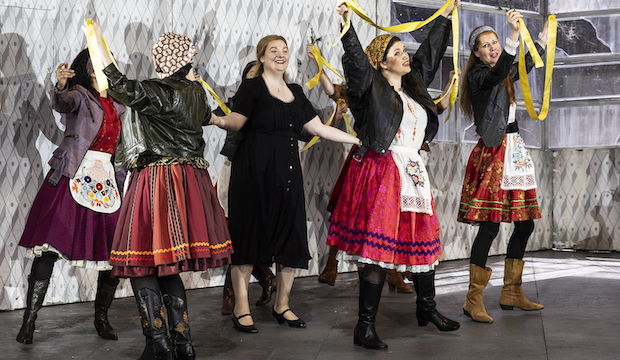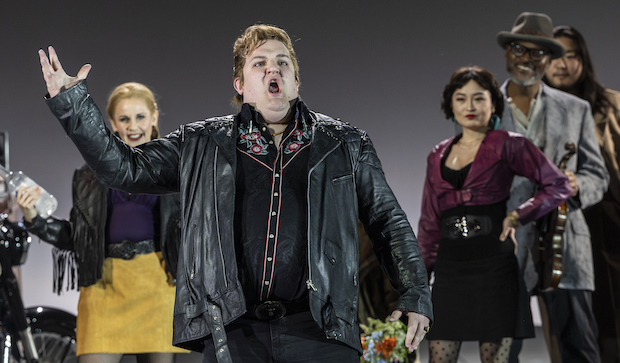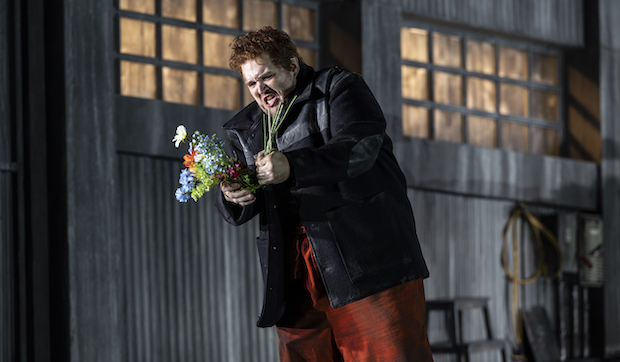Jenufa, English National Opera review ★★★★★
Janáček's searing opera in an Olivier-award production is revived with a new cast
John Findon as the faithless Steva in Jenufa at ENO. Photo: Ellie Kurttz
He seems like such a catch, the swaggering, leather-clad heir to a going concern, with his motorbike and slicked-back hair. No wonder the girls go crazy for this village Elvis. Why bookish Jenufa, in her sensible tea-dress and cardigan, should fall for this unreliable stud, Števa, is a bit of a mystery.
But good women go for terrible men, and, unmarried, she is carrying his baby, a source of unspeakable shame for her and her righteous stepmother. After the secret birth the stepmother feels there can be only one terrible course of action.
The real-life stories behind Leoš Janáček's 1904 opera, Jenufa, were first recorded in newspapers read by the avant-garde writer Gabriela Preissová, who combined two shocking crimes into her 1890 play, Her Stepdaughter. The slashing of a young woman's face by a jealous suitor and the discovery of a dead baby were combined in a script that was condemned by some as brutal, revolting and immoral.

Short-lived happiness on a wedding day in Jenufa. Photo: Ellie Kurttz
At the same time, the Czech-born composer was discovering both Tchaikovsky's psychologically penetrating Queen of Spades, as musicologist Mark Audus notes in one of two excellent programme essays. Janáček also experienced Italian 'real-life' verismo opera, as exemplified by Mascagni's Cavalleria Rusticana, another village-set drama. Furthermore, his own daughter, Olga, having also fallen for an unsuitable man, was mortally ill. Janáček set about making an opera of Her Stepdaughter. Olga died three weeks before its completion.
Jenufa is shot through, then, with genuine tragedy, and David Alden's production for English National Opera, now in its 19th year, still packs a punch. The action takes place in the worn-out Czechoslovakia of communist leader Alexander Dubček, whose picture hangs on the office wall at a grim factory. Sparks fly to an agitated drilling in the orchestral score, while Laca, a factory hand and half-brother of the unsuitable Števa, noodles with his tools, and asks for his knife to be sharpened, never a good sign.
Workers and townspeople make what they can of their pinched lives, dancing and flirting, to the disapproval of the step-mother, known as the Kostelnička, a sort of village elder. Despite its title, the opera is dominated by this fierce and ruthless preserver of reputation. Soprano Susan Bullock sings this hard-hearted monster with an iron edge to the voice, her ultimate breakdown scooping her out to leave a beady, colourless husk.

John Findon as bragging Steva. Photo: Ellie Kurttz
In the title role, Jennifer Davies, who made her name in Wagner here and at the Royal Opera House, brings her winning combination of clarity, substance and golden tone. Her Števa is brutishly sung by tenor John Findon, who can turn on romantic charm like a tap, when Jenufa despairs that they might part. Tenor Richard Trey Smagur's Laca, who overhears this, and who truly loves her, spots the flaw: Števa only loves her for her looks. Here comes that sharpened knife… But after an act of violence, there was no real sign of that instant flood of remorse that usually overwhelms Laca, in a rather disappointingly unnuanced UK debut.
Months later, disfigured and disgraced, Jenufa can still count on Laca, however, and it's wedding season: first this couple, then Števa and his new squeeze, Karolka, vivaciously sung by Segomotso Masego Shupinyaneng and a breath of fresh air as she breezes into the Kostelnička's stultifying home. Janacek, who made a study of Moravian folk music, lightens the mood with a wedding dance, making the most of the dramatic contrast between celebration and the imminent discovery of a dead child.

Richard Trey Smagur is tormented by love for Jenufa. Photo: Ellie Kurttz
This Oliver award-winning production, revived by Alden himself, at times feels baggy, unfocused and crude. Why does no one go after the injured Jenufa? Why does the murderous Kostelnička, once apprehended, wander off on her own? Was there so much crotch-rubbing and dry-humping in the original production? It feels condescending to suggest that deprived people are automatically rendered bestial.
Happily, in the pit, there is great beauty in the playing of the Orchestra of English National Opera under Keri-Lynn Wilson, who draws out the brightest light and darkest shade in this remarkable, mould-breaking score.
Jenufa is sung in English with English surtitles. Remaining are performances are on 16, 20, 22, 25 and 27 March. Click here to book
But good women go for terrible men, and, unmarried, she is carrying his baby, a source of unspeakable shame for her and her righteous stepmother. After the secret birth the stepmother feels there can be only one terrible course of action.
The real-life stories behind Leoš Janáček's 1904 opera, Jenufa, were first recorded in newspapers read by the avant-garde writer Gabriela Preissová, who combined two shocking crimes into her 1890 play, Her Stepdaughter. The slashing of a young woman's face by a jealous suitor and the discovery of a dead baby were combined in a script that was condemned by some as brutal, revolting and immoral.

Short-lived happiness on a wedding day in Jenufa. Photo: Ellie Kurttz
At the same time, the Czech-born composer was discovering both Tchaikovsky's psychologically penetrating Queen of Spades, as musicologist Mark Audus notes in one of two excellent programme essays. Janáček also experienced Italian 'real-life' verismo opera, as exemplified by Mascagni's Cavalleria Rusticana, another village-set drama. Furthermore, his own daughter, Olga, having also fallen for an unsuitable man, was mortally ill. Janáček set about making an opera of Her Stepdaughter. Olga died three weeks before its completion.
Jenufa is shot through, then, with genuine tragedy, and David Alden's production for English National Opera, now in its 19th year, still packs a punch. The action takes place in the worn-out Czechoslovakia of communist leader Alexander Dubček, whose picture hangs on the office wall at a grim factory. Sparks fly to an agitated drilling in the orchestral score, while Laca, a factory hand and half-brother of the unsuitable Števa, noodles with his tools, and asks for his knife to be sharpened, never a good sign.
Workers and townspeople make what they can of their pinched lives, dancing and flirting, to the disapproval of the step-mother, known as the Kostelnička, a sort of village elder. Despite its title, the opera is dominated by this fierce and ruthless preserver of reputation. Soprano Susan Bullock sings this hard-hearted monster with an iron edge to the voice, her ultimate breakdown scooping her out to leave a beady, colourless husk.

John Findon as bragging Steva. Photo: Ellie Kurttz
In the title role, Jennifer Davies, who made her name in Wagner here and at the Royal Opera House, brings her winning combination of clarity, substance and golden tone. Her Števa is brutishly sung by tenor John Findon, who can turn on romantic charm like a tap, when Jenufa despairs that they might part. Tenor Richard Trey Smagur's Laca, who overhears this, and who truly loves her, spots the flaw: Števa only loves her for her looks. Here comes that sharpened knife… But after an act of violence, there was no real sign of that instant flood of remorse that usually overwhelms Laca, in a rather disappointingly unnuanced UK debut.
Months later, disfigured and disgraced, Jenufa can still count on Laca, however, and it's wedding season: first this couple, then Števa and his new squeeze, Karolka, vivaciously sung by Segomotso Masego Shupinyaneng and a breath of fresh air as she breezes into the Kostelnička's stultifying home. Janacek, who made a study of Moravian folk music, lightens the mood with a wedding dance, making the most of the dramatic contrast between celebration and the imminent discovery of a dead child.

Richard Trey Smagur is tormented by love for Jenufa. Photo: Ellie Kurttz
This Oliver award-winning production, revived by Alden himself, at times feels baggy, unfocused and crude. Why does no one go after the injured Jenufa? Why does the murderous Kostelnička, once apprehended, wander off on her own? Was there so much crotch-rubbing and dry-humping in the original production? It feels condescending to suggest that deprived people are automatically rendered bestial.
Happily, in the pit, there is great beauty in the playing of the Orchestra of English National Opera under Keri-Lynn Wilson, who draws out the brightest light and darkest shade in this remarkable, mould-breaking score.
Jenufa is sung in English with English surtitles. Remaining are performances are on 16, 20, 22, 25 and 27 March. Click here to book
TRY CULTURE WHISPER
Receive free tickets & insider tips to unlock the best of London — direct to your inbox
| What | Jenufa, English National Opera review |
| Where | English National Opera, London Coliseum, St Martin's Lane, London, WC2N 4ES | MAP |
| Nearest tube | Charing Cross (underground) |
| When |
13 Mar 24 – 27 Mar 24, Six performances, start times vary. Running time 2hr 35min, including one interval |
| Price | £0-£150 |
| Website | Click here for details and booking |